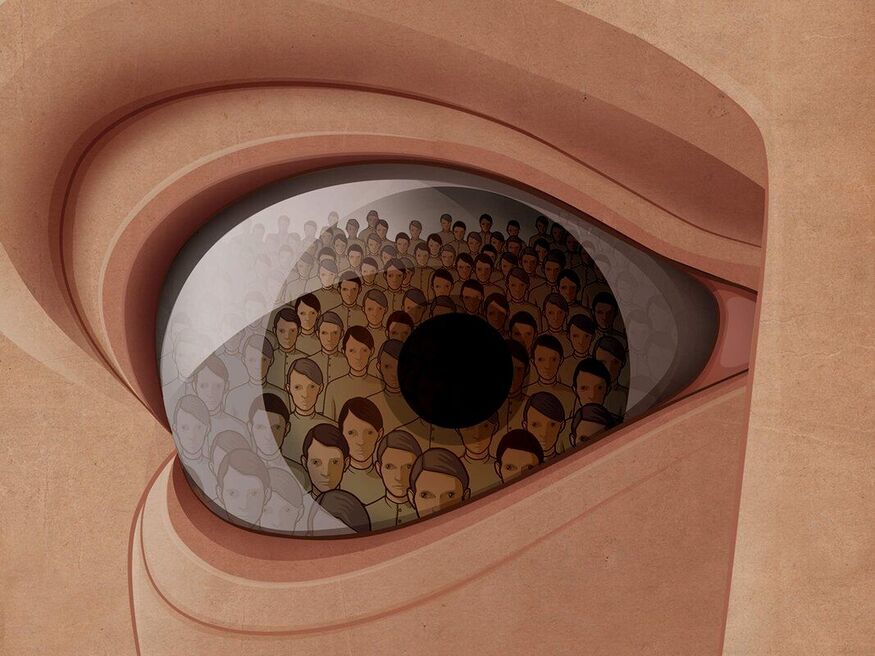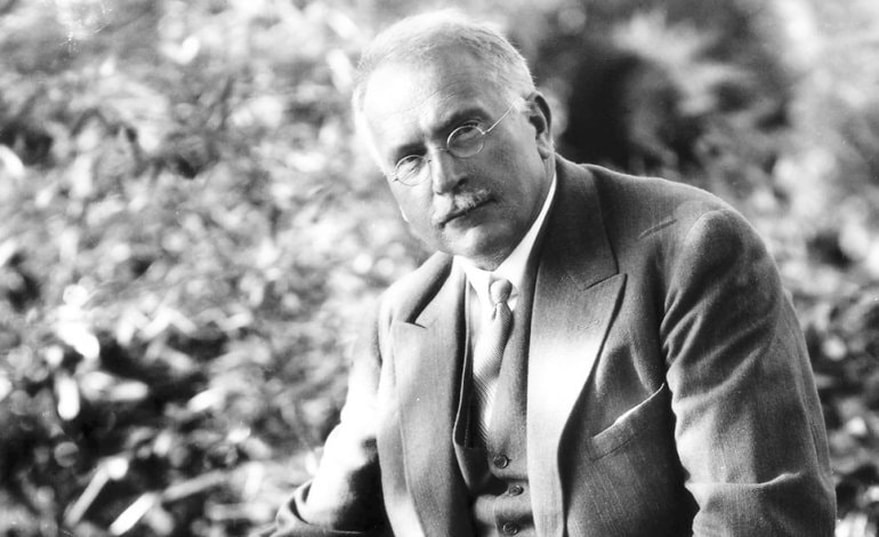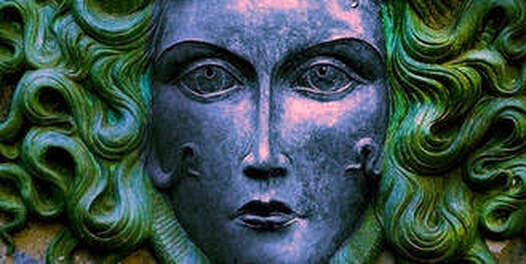Souls in Darkness
Psychopaths in Therapy
Psychopaths in Therapy
Everyone, including the experts, can be taken in, conned, and left bewildered by them. A good psychopath can play a concerto on anyone's heart strings – Robert Hare M.D.
Contrary to popular belief, some psychopaths suspect there is something wrong with them, which is why on rare occasions they seek out experts in psychology and enter therapy.
Consequently, we know quite a bit about these types and what makes them tick. There’s still a long way to go though.
As far as I am concerned, there are many roads still to be explored and re-explored. We need to take seriously the findings of the great critics of psychiatry, and may need to dismantle psychiatry altogether, given the crimes it perpetrates against normal people.
We must certainly incorporate the insights of R. D. Laing, Thomas Szasz, Otto Rank, Wilhelm Reich, Arthur Janov, Karen Horney, Melanie Klein, Alice Miller, and others of their brilliance, in order to sensibly combat pathology on all levels. If we are inclined to believe that there are absolute cures for pathological tendencies, let’s prove it by bringing their superlative works to the table.
Personally, I don’t think psychopaths can be cured, not even when they enter therapy. This is partly because most psychopaths do not really wish to change their ways, and enter therapy to convince themselves of this. If those seeking to change them are found to be losers, posers or idiots, the psychopath contemptuously walks away convinced of his own competence and superiority.
Delving deeply into their own psychology is bound to trouble them greatly, and their interest is certainly not sincere enough to result in any kind of lasting cure. To fix a psychopath one would need to alter every incident experienced throughout their childhoods.
Actually, in today's world the psychopath has little to fear from therapy. This is because it's not usually very deep or sincere. The psychopath need not be traumatized or upset by it or its practitioners. Not after he becomes familiar with what therapy entails, and realizes it does not necessarily require any radical change whatsoever. His shrink isn’t Sigmund Freud, Otto Rank or Carl Jung. On the contrary, it’s usually some young drug-peddling psychiatrist who can easily be bamboozled and taken for a ride.
Add to this the fact that most allegedly normal people in the world are totally resistant to self-analysis and psychological development, and we see why a cunning psychopath might let himself by analyzed. He knows what the doctor doesn’t – that there is no Self to analyze and that the doctor’s far from being an authentic champion of Selfhood. Despite his degree, shiny nameplate and battery of tests, he’s as self-deceived as everyone else. He might even be an apologist for conformity and acculturation, whose notion of health may be adjustment to an abnormal society.
The most strongly enforced of all known taboos, is the taboo against knowing who or what you really are behind the mask of your apparently separate, independent and isolated ego - Alan Watts
Consequently, we know quite a bit about these types and what makes them tick. There’s still a long way to go though.
As far as I am concerned, there are many roads still to be explored and re-explored. We need to take seriously the findings of the great critics of psychiatry, and may need to dismantle psychiatry altogether, given the crimes it perpetrates against normal people.
We must certainly incorporate the insights of R. D. Laing, Thomas Szasz, Otto Rank, Wilhelm Reich, Arthur Janov, Karen Horney, Melanie Klein, Alice Miller, and others of their brilliance, in order to sensibly combat pathology on all levels. If we are inclined to believe that there are absolute cures for pathological tendencies, let’s prove it by bringing their superlative works to the table.
Personally, I don’t think psychopaths can be cured, not even when they enter therapy. This is partly because most psychopaths do not really wish to change their ways, and enter therapy to convince themselves of this. If those seeking to change them are found to be losers, posers or idiots, the psychopath contemptuously walks away convinced of his own competence and superiority.
Delving deeply into their own psychology is bound to trouble them greatly, and their interest is certainly not sincere enough to result in any kind of lasting cure. To fix a psychopath one would need to alter every incident experienced throughout their childhoods.
Actually, in today's world the psychopath has little to fear from therapy. This is because it's not usually very deep or sincere. The psychopath need not be traumatized or upset by it or its practitioners. Not after he becomes familiar with what therapy entails, and realizes it does not necessarily require any radical change whatsoever. His shrink isn’t Sigmund Freud, Otto Rank or Carl Jung. On the contrary, it’s usually some young drug-peddling psychiatrist who can easily be bamboozled and taken for a ride.
Add to this the fact that most allegedly normal people in the world are totally resistant to self-analysis and psychological development, and we see why a cunning psychopath might let himself by analyzed. He knows what the doctor doesn’t – that there is no Self to analyze and that the doctor’s far from being an authentic champion of Selfhood. Despite his degree, shiny nameplate and battery of tests, he’s as self-deceived as everyone else. He might even be an apologist for conformity and acculturation, whose notion of health may be adjustment to an abnormal society.
The most strongly enforced of all known taboos, is the taboo against knowing who or what you really are behind the mask of your apparently separate, independent and isolated ego - Alan Watts
Psychiatry allegedly holds up a mirror in which the psychopath supposedly sees himself as he truly is. But if the mirror is warped the project is doomed to failure, and if the patient has no Self, there's nothing much to see or fix.
The psychopath who, of his own will, endures a few therapy sessions, does so because he's interested in learning more about how “normal” types tick. What he comes to learn about himself, if anything, is of far less importance.
Even if there is a modicum of sincerity, he may simply wish to solve his problem quickly, by way of a weekly pep talk and/or medication. Certainly, this is the case with semi-psychopathic types who don’t display the full array of pathological tendencies, and who, it is believed, may be positively affected by treatment of this kind.
Learning about other people is of interest to some psychopaths. After all, they were born surrounded by other people and operate in a society full of types they do not fully understand.
Other people act quite differently to them. Their temperaments, humor, habits, preferences, sexual needs, and so on, are often radically different from that of the psychopath, and he knows it. He's not to blame for getting curious about the mindset and habits of his prey.
And as said elsewhere, we are not to confuse psychopathic types with common-or-garden neurotics or manic-depressives. The psychopath has more in common with the paranoic, schizophrenic, psychotic, sadist, narcissist and megalomaniac. The good guys.
The narcissist and psychotic are never wrong, and are what they are because of their obsessive need to blame others for everything that goes wrong for them. The neurotic is not as far gone, and is still able to accept personal responsibility. Indeed, the neurotic type suffers by over-blaming himself. If he enters therapy, he can be helped.
Even if there is a modicum of sincerity, he may simply wish to solve his problem quickly, by way of a weekly pep talk and/or medication. Certainly, this is the case with semi-psychopathic types who don’t display the full array of pathological tendencies, and who, it is believed, may be positively affected by treatment of this kind.
Learning about other people is of interest to some psychopaths. After all, they were born surrounded by other people and operate in a society full of types they do not fully understand.
Other people act quite differently to them. Their temperaments, humor, habits, preferences, sexual needs, and so on, are often radically different from that of the psychopath, and he knows it. He's not to blame for getting curious about the mindset and habits of his prey.
And as said elsewhere, we are not to confuse psychopathic types with common-or-garden neurotics or manic-depressives. The psychopath has more in common with the paranoic, schizophrenic, psychotic, sadist, narcissist and megalomaniac. The good guys.
The narcissist and psychotic are never wrong, and are what they are because of their obsessive need to blame others for everything that goes wrong for them. The neurotic is not as far gone, and is still able to accept personal responsibility. Indeed, the neurotic type suffers by over-blaming himself. If he enters therapy, he can be helped.
I know I don't really exist, and was wondering if there's a cure?
Nine times out of ten, there’s not much wrong with the psychopath’s sexual life. Why should there be? It’s just a physical act. Because no feeling is involved, and because there’s no genuine care for the other person, what’s the problem? The psychopath has no hang-ups in this regard, no need to sweat bullets like a neurotic or seek out head-shrinkers to help him develop confidence with the opposite sex. Sex is mere recreation for the psychopath.
Indeed, male psychopaths often have no problem getting dates. Many women actually find themselves attracted to them, adoring the fact that they can finally be with a “man” uninhibited by loathsome morals, ideals, sensitivity, hang-ups or qualms. They just get on with it, and don’t care about boring social graces. In extreme form this condition is known as Hybristophilia.
Indeed, male psychopaths often have no problem getting dates. Many women actually find themselves attracted to them, adoring the fact that they can finally be with a “man” uninhibited by loathsome morals, ideals, sensitivity, hang-ups or qualms. They just get on with it, and don’t care about boring social graces. In extreme form this condition is known as Hybristophilia.
Honor thy thug!
No, it’s not sexual encounters and dynamics that disable the psychopath. It’s human relationships in general that prove problematic as he ages.
The psychopath lives somewhat like an extraterrestrial on earth. Despite his chameleon-like morphing and consummate acts of mirroring, he’s not in touch with others empathically. Consequently, he’s quite curious about the traits he lacks. What is it you’ve got that I don’t? Have you got something I want? If so I'm takin' it.
His entering therapy lark is merely an extension of his thuggery, his need to devour, ransack and pillage.
Many psychopaths describe the traditional treatment programmes as finishing schools where they hone their skills. Where they find out that there are lots of techniques they had not thought about before – Robert Hare
Dabbling in psychology helps the psychopath improve his battle tactics against his enemy - the human race. It helps him pin humans to a board like an entomologist.
His experimentation is doomed however, because unlike complex normal people he cannot look within for guidance. He's incapable of judging the nature and intentions of others by sussing what he would do or think in their place. Therefore, his flirtation with psychology eventually proves useless. It leaves him feeling even more empty and alienated than usual, reminding him that he is not the same as other people. He soon finds himself in the middle of nowhere without a compass.
The psychopath lives somewhat like an extraterrestrial on earth. Despite his chameleon-like morphing and consummate acts of mirroring, he’s not in touch with others empathically. Consequently, he’s quite curious about the traits he lacks. What is it you’ve got that I don’t? Have you got something I want? If so I'm takin' it.
His entering therapy lark is merely an extension of his thuggery, his need to devour, ransack and pillage.
Many psychopaths describe the traditional treatment programmes as finishing schools where they hone their skills. Where they find out that there are lots of techniques they had not thought about before – Robert Hare
Dabbling in psychology helps the psychopath improve his battle tactics against his enemy - the human race. It helps him pin humans to a board like an entomologist.
His experimentation is doomed however, because unlike complex normal people he cannot look within for guidance. He's incapable of judging the nature and intentions of others by sussing what he would do or think in their place. Therefore, his flirtation with psychology eventually proves useless. It leaves him feeling even more empty and alienated than usual, reminding him that he is not the same as other people. He soon finds himself in the middle of nowhere without a compass.
The world of other people must exist in order for a psychopath to not only become who he is, but to provide him with cover. Indeed, the more schizogenic societies become, the less the psychopathic type stands out. In the present anti-psychological age we can expect to see a sharp increase in psychological deviants, moral inferiors and malingerers. The more emotionally mutilated children from broken homes, the more culture degenerates. Psychology has been in our world since 1900, yet things have only got worse when it comes to existential fallout. As Vernon Howard remarked, human sickness is so severe few can bear to look at it, but those who do become well. However, if most people choose not to look at life psychologically, they'll inherit a world full of mutilated souls in darkness.
Because of this, the psychopath is often drowned in envy, suspicion and rage toward the world. He surmises that other people do have things he doesn't. He's angry that he can't have these things, and in order to lessen his childish feeling of lack, he swells up and acts as if he's untouchable and high and mighty. As time passes he becomes ever more grandiose, contemptuous and cruel toward people. He programs himself to believe that everyone he attracts holds something back from him. Ergo, he's justified in treating them badly.
The life and will of the psychopath occasionally gets derailed when he sees the productivity and creativity of certain people in the world. It’s not that he is capable of admiring greatness, only that it’s quite foreign to his nature. Hence his curiosity. Is there a way, he muses, to parody these creative types. It would be nice.
However, as he finds out more, he quickly abandons the project and looks for more promising objectives. He’s affronted by the fact that he’s incapable of reaching down into his being to tap the caches of bioenergy and emotion needed to create great artwork and maintain a genuinely artistic lifestyle.
Beauty and ugliness, except in a very superficial sense; goodness, evil, love, horror and humor have no actual meaning, no power to move him - Hervey Checkley M.D.
High art can’t exist unless its producer suffers. The artist awakens inner fortitude in response to his suffering, given that it is a legitimate emanation of his being – his Imperial Self. The psychopath is the absolute antithesis of the artist in this sense. He’s the man who has nothing to feel, about himself or anything else. Having closed himself off to suffering, he ceases to exist as a Being.
Certainly, the curiosity of psychopaths drives them into temporary relationships, which explains why they appear in one’s life. Many highly creative and productive types find psychopaths in their midst. They don’t usually realize, until much later, why the psychopath was attracted to them. Falling for the psychopath’s mask, we make the cardinal mistake of thinking that the psychopath’s interest is sincere and genuine. They really love me! They really do! They give so much and want so little!
The sorry victim soon discovers that everything they believed about the psychopath was absolutely false.
It is as if the psychopath resembles a convex lens. When we look into it, we see ourselves as we would in a normal mirror, except for the fact that our image is slightly enlarged. And boy do we like that. We love being around people who make us feel grander than we are. It’s a ruse often employed to great effect by psychopaths and vampiristic types. We bask in the “reflection” they provide, and soon come to depend on their company and feedback. The more they whisper in our ears, the more pumped-up we become.
This trick works wonders on people with low Self-esteem, who’ve been repeatedly put down by the world. The lower the Self-image the more likely the vamp or psychopath will come along to schmooze the hell out of us. We drown, but we drown in honey.
The psychopath is an expert love-bomber. And he finds victims in plenty. He can easily rule a world using techniques of this kind. He can even fool specialists. Indeed, he might choose to confront them head on by entering therapy, putting on a pretence that something is wrong with him, and that he genuinely seeks to change his ways. In the end the chameleon has the experts dancing to his tune and chasing their own tails.
The two greatest experts who made the deepest studies into the nature and habits of psychopaths are Dr. Hervey Checkley and Dr. Robert Hare. The former wrote The Masks of Sanity, the latter Without Conscience. These works are the nearest thing to manuals of psychopathology, and are highly recommended.
The life and will of the psychopath occasionally gets derailed when he sees the productivity and creativity of certain people in the world. It’s not that he is capable of admiring greatness, only that it’s quite foreign to his nature. Hence his curiosity. Is there a way, he muses, to parody these creative types. It would be nice.
However, as he finds out more, he quickly abandons the project and looks for more promising objectives. He’s affronted by the fact that he’s incapable of reaching down into his being to tap the caches of bioenergy and emotion needed to create great artwork and maintain a genuinely artistic lifestyle.
Beauty and ugliness, except in a very superficial sense; goodness, evil, love, horror and humor have no actual meaning, no power to move him - Hervey Checkley M.D.
High art can’t exist unless its producer suffers. The artist awakens inner fortitude in response to his suffering, given that it is a legitimate emanation of his being – his Imperial Self. The psychopath is the absolute antithesis of the artist in this sense. He’s the man who has nothing to feel, about himself or anything else. Having closed himself off to suffering, he ceases to exist as a Being.
Certainly, the curiosity of psychopaths drives them into temporary relationships, which explains why they appear in one’s life. Many highly creative and productive types find psychopaths in their midst. They don’t usually realize, until much later, why the psychopath was attracted to them. Falling for the psychopath’s mask, we make the cardinal mistake of thinking that the psychopath’s interest is sincere and genuine. They really love me! They really do! They give so much and want so little!
The sorry victim soon discovers that everything they believed about the psychopath was absolutely false.
It is as if the psychopath resembles a convex lens. When we look into it, we see ourselves as we would in a normal mirror, except for the fact that our image is slightly enlarged. And boy do we like that. We love being around people who make us feel grander than we are. It’s a ruse often employed to great effect by psychopaths and vampiristic types. We bask in the “reflection” they provide, and soon come to depend on their company and feedback. The more they whisper in our ears, the more pumped-up we become.
This trick works wonders on people with low Self-esteem, who’ve been repeatedly put down by the world. The lower the Self-image the more likely the vamp or psychopath will come along to schmooze the hell out of us. We drown, but we drown in honey.
The psychopath is an expert love-bomber. And he finds victims in plenty. He can easily rule a world using techniques of this kind. He can even fool specialists. Indeed, he might choose to confront them head on by entering therapy, putting on a pretence that something is wrong with him, and that he genuinely seeks to change his ways. In the end the chameleon has the experts dancing to his tune and chasing their own tails.
The two greatest experts who made the deepest studies into the nature and habits of psychopaths are Dr. Hervey Checkley and Dr. Robert Hare. The former wrote The Masks of Sanity, the latter Without Conscience. These works are the nearest thing to manuals of psychopathology, and are highly recommended.
Dr. Robert Hare, author of Without Conscience
Checkley’s contribution is especially insightful because his case-histories prove that many psychopathic types seek institutionalization purely as a means of physical survival. When and if the world proves too difficult and complicated, there’s always hospitalization and its perks.
As psychopathic types age, they’re not as able to get away with their insidious and often criminal behavior. Like all of us, they find their energy and attractiveness waning. They realize they have no true friends, and that society is a little sharper when it comes to their insidious identity and antics. Consequently, it is not unusual for a less than successful or attractive psychopath to allow himself to be taken into care. He may even commit serious crimes in order to ensure it.
Thomas Szasz and R. D. Laing harped on the fact that most inmates in psychiatric institutions are consummate malingerers and have been since the early eighteenth century. It’s still an idea that meets with considerable resistance from “experts.” I think we can guess why? ($ $ $)
Conversely, as the western world becomes more and more “liberal-minded,” the more psychopathic types are able to milk the system, exploiting inexpert experts and other bleeding hearts possessed by absurd ideas of equality and social justice.
With the assistance of the criminal justice system, more and more non-psychopathic criminals are able to claim insanity and be conveyed over to the psychiatric wing for soft treatment. From that moment on they are rarely if ever prosecuted again. Should they commit further crimes, no criminal trial commences. They are simply re-incarcerated in the same madhouse they escaped from. Some of the most serious crimes in our communities are committed by men and women already incarcerated in low-security mental homes.
As psychopathic types age, they’re not as able to get away with their insidious and often criminal behavior. Like all of us, they find their energy and attractiveness waning. They realize they have no true friends, and that society is a little sharper when it comes to their insidious identity and antics. Consequently, it is not unusual for a less than successful or attractive psychopath to allow himself to be taken into care. He may even commit serious crimes in order to ensure it.
Thomas Szasz and R. D. Laing harped on the fact that most inmates in psychiatric institutions are consummate malingerers and have been since the early eighteenth century. It’s still an idea that meets with considerable resistance from “experts.” I think we can guess why? ($ $ $)
Conversely, as the western world becomes more and more “liberal-minded,” the more psychopathic types are able to milk the system, exploiting inexpert experts and other bleeding hearts possessed by absurd ideas of equality and social justice.
With the assistance of the criminal justice system, more and more non-psychopathic criminals are able to claim insanity and be conveyed over to the psychiatric wing for soft treatment. From that moment on they are rarely if ever prosecuted again. Should they commit further crimes, no criminal trial commences. They are simply re-incarcerated in the same madhouse they escaped from. Some of the most serious crimes in our communities are committed by men and women already incarcerated in low-security mental homes.
Hervey Checkley's book of case-histories expertly documents the devious behavior of psychopaths.
The average psychopath does lack a lot, but rarely grasps this fact. Although he thinks himself superior to other people, he isn’t capable of feeling deeply. He never introspects. Any and all meaning found in his cold dry existence comes exclusively from without. Moreover, what he thinks of as "meaningful" is a grotesque joke.
Existentially, he's deeply impoverished. It's not far-fetched to say that he’s not there at all. As a being, he doesn’t really exist. Take societal trappings away and he’ll simply implode.
What's left of superego function sends him into the social world where he devises the many manipulative techniques by which he gets what he wants and needs. “He’s a true fisher of men.”
Given that his existence and fate depends upon the Mitwelt (society), he sometimes does find himself asking relatively intelligent questions about it. If he wants to excel in social terms – as a parent, teacher, social-worker, civil-servant or politician, etc – he’ll need to know something about his stalking grounds.
Psychopaths view any social exchange as a 'feeding opportunity,' a contest or a test of wills in which there can be only one winner. Their motives are to manipulate and take, ruthlessly and without remorse – Robert Hare
Since the psychopath is unencumbered by emotion, he can easily focus his brain and learn things quickly. If he already has a high IQ, his success is certain. This is why we find a great many psychopaths in high places. They covet the power offered them by religious and political appointments. Our present hierarchical systems make it easy for psychopathic types to excel. Indeed, our world is infested with them. Without upgrading our psychological knowledge, we have no way of ridding ourselves of their loathsome presence.
Sadly, no expert on pathological types dares utter a word of this in public. There's no longer any mention of the effect on society of psychopaths in high places, and no comment about how whole nations can be psychopathic.
The psychopath’s shallow fleeting interest in his condition isn’t dissimilar to a normal person’s interest in themselves. Everyone enjoys talking about themselves, particularly the psychopath, and it costs him nothing if others inquire into his odd behavior. It might even be an agreeable challenge.
Since so many people tumble for the psychopath's mask-play, it’s quite refreshing to encounter wiser types who don’t. Add to this the psychopath’s tendency to engage in sick games. He revels in the fact that his thoughts are his and his alone. But for a lark, he plays with the therapist and makes believe he’s open to being “understood.” It’s great fun, and the psychopath continues playing the game until it gets boring. He finally walks away with a contemptuous grin. You fools have no idea who I am. I’ve beaten all your silly tests.
Sooner or later the average therapist realizes he’s wasting his time. Most other pathological types respond well enough, even outright criminals. Not the paranoid-schizophrenic and psychopath. They don’t change their ways, mainly for two reasons:
Firstly, they think themselves superior to the doctor, and secondly, they can’t be made to see themselves as wrong. They lack the introspective capacity for self-analysis. In Reichean terms they are severely armored types. Although the doctor’s interest is tacitly recognized as a kind of “caring,” the psychopath considers himself above customary virtue-signals. He’s exorcised love, care, concern and empathy from his being, and long since learned to live without them getting in his way.
The psychopath is always distinguished by egocentricity – Hervey Checkley
He’s actually glad to be free of the encumbrance of everyday virtues, and won’t ever allow them to be reawakened within him. It’s too great a sacrifice. Doing so means he’d be reduced to the level of the average Joe, for whom he has nothing but contempt. Doing so removes his feelings of superiority. It's unfair, since as far as he’s concerned, it’s other people who are immoral defectives - lying, cheating, punishing, torturing, warring and order-following.
Impervious to counseling, the psychopath never changes. In fact, even his external appearance remains relatively steadfast. It has been noted that the lifestyle of most psychopaths is relatively unchanging. In the worst cases, it’s perfectly static. Twenty or thirty years can pass and they’ll be exactly the same as when you first met them. It’s as if they’ve been fossilized by the Medusa. (Maybe they have.)
Whatever changes do occur, are slight. They may exist only because this or that person makes a temporary appearance in their lives, bringing newness with them. But should the person exit, the psychopath falls back to his default blank mode of being.
Sociopaths…do not care about other people, and so do not miss them when they are alienated or gone, except as one might regret the absence of a useful appliance that one had somehow lost – Martha Stout
Analysis of the psychopath’s dream-life also reveals little to no change. Well, of course! How could it? As said, they’ve cut off all feeling and are not in contact with their unconscious. If they were, they’d not be psychopaths.
The ego-feeling we are of aware of now is thus only a shrunken vestige of a far more extensive feeling – a feeling which embraced the universe – Sigmund Freud
Looking at psychopaths from a Jungian viewpoint, we see that they aren’t in contact with their Archetypes. More accurately, the archetypes are not in contact with them, at least not in a healthy way. If they do appear, it’s in antagonistic form. This is because the influence of unintegrated archetypes is bound to eventually turn dark. It's the price we pay for hinterlanding the Self, or supreme archetype. Like unfed dogs the archetypes soon become ravenous, threatening and untamed. The ego stands to be overwhelmed by their presence, and may give way at any time.
Existentially, he's deeply impoverished. It's not far-fetched to say that he’s not there at all. As a being, he doesn’t really exist. Take societal trappings away and he’ll simply implode.
What's left of superego function sends him into the social world where he devises the many manipulative techniques by which he gets what he wants and needs. “He’s a true fisher of men.”
Given that his existence and fate depends upon the Mitwelt (society), he sometimes does find himself asking relatively intelligent questions about it. If he wants to excel in social terms – as a parent, teacher, social-worker, civil-servant or politician, etc – he’ll need to know something about his stalking grounds.
Psychopaths view any social exchange as a 'feeding opportunity,' a contest or a test of wills in which there can be only one winner. Their motives are to manipulate and take, ruthlessly and without remorse – Robert Hare
Since the psychopath is unencumbered by emotion, he can easily focus his brain and learn things quickly. If he already has a high IQ, his success is certain. This is why we find a great many psychopaths in high places. They covet the power offered them by religious and political appointments. Our present hierarchical systems make it easy for psychopathic types to excel. Indeed, our world is infested with them. Without upgrading our psychological knowledge, we have no way of ridding ourselves of their loathsome presence.
Sadly, no expert on pathological types dares utter a word of this in public. There's no longer any mention of the effect on society of psychopaths in high places, and no comment about how whole nations can be psychopathic.
The psychopath’s shallow fleeting interest in his condition isn’t dissimilar to a normal person’s interest in themselves. Everyone enjoys talking about themselves, particularly the psychopath, and it costs him nothing if others inquire into his odd behavior. It might even be an agreeable challenge.
Since so many people tumble for the psychopath's mask-play, it’s quite refreshing to encounter wiser types who don’t. Add to this the psychopath’s tendency to engage in sick games. He revels in the fact that his thoughts are his and his alone. But for a lark, he plays with the therapist and makes believe he’s open to being “understood.” It’s great fun, and the psychopath continues playing the game until it gets boring. He finally walks away with a contemptuous grin. You fools have no idea who I am. I’ve beaten all your silly tests.
Sooner or later the average therapist realizes he’s wasting his time. Most other pathological types respond well enough, even outright criminals. Not the paranoid-schizophrenic and psychopath. They don’t change their ways, mainly for two reasons:
Firstly, they think themselves superior to the doctor, and secondly, they can’t be made to see themselves as wrong. They lack the introspective capacity for self-analysis. In Reichean terms they are severely armored types. Although the doctor’s interest is tacitly recognized as a kind of “caring,” the psychopath considers himself above customary virtue-signals. He’s exorcised love, care, concern and empathy from his being, and long since learned to live without them getting in his way.
The psychopath is always distinguished by egocentricity – Hervey Checkley
He’s actually glad to be free of the encumbrance of everyday virtues, and won’t ever allow them to be reawakened within him. It’s too great a sacrifice. Doing so means he’d be reduced to the level of the average Joe, for whom he has nothing but contempt. Doing so removes his feelings of superiority. It's unfair, since as far as he’s concerned, it’s other people who are immoral defectives - lying, cheating, punishing, torturing, warring and order-following.
Impervious to counseling, the psychopath never changes. In fact, even his external appearance remains relatively steadfast. It has been noted that the lifestyle of most psychopaths is relatively unchanging. In the worst cases, it’s perfectly static. Twenty or thirty years can pass and they’ll be exactly the same as when you first met them. It’s as if they’ve been fossilized by the Medusa. (Maybe they have.)
Whatever changes do occur, are slight. They may exist only because this or that person makes a temporary appearance in their lives, bringing newness with them. But should the person exit, the psychopath falls back to his default blank mode of being.
Sociopaths…do not care about other people, and so do not miss them when they are alienated or gone, except as one might regret the absence of a useful appliance that one had somehow lost – Martha Stout
Analysis of the psychopath’s dream-life also reveals little to no change. Well, of course! How could it? As said, they’ve cut off all feeling and are not in contact with their unconscious. If they were, they’d not be psychopaths.
The ego-feeling we are of aware of now is thus only a shrunken vestige of a far more extensive feeling – a feeling which embraced the universe – Sigmund Freud
Looking at psychopaths from a Jungian viewpoint, we see that they aren’t in contact with their Archetypes. More accurately, the archetypes are not in contact with them, at least not in a healthy way. If they do appear, it’s in antagonistic form. This is because the influence of unintegrated archetypes is bound to eventually turn dark. It's the price we pay for hinterlanding the Self, or supreme archetype. Like unfed dogs the archetypes soon become ravenous, threatening and untamed. The ego stands to be overwhelmed by their presence, and may give way at any time.
Carl Jung's archetypes are the unconscious ruling influences behind conscious emotion and thought. Pushing away the Self entails losing contact with them, which in turn causes severe pathology. Societies as well as individuals can become so apollonian and dissociated that they eventually collapse. (Click image for more...)
The half-way point to this psychic fallout is the time when one or more of the archetypes becomes increasingly trickster-like. Indeed, as Jung contentiously pointed out, this can occur on a national level.
In individuals, antagonistic archetypes upset the daily routine and flood one’s mind with all sorts of pathological content. Insomnia is one way we attempt to deal with the situation. By denying ourselves sleep we hope to inhibit the intrusion of archetypal forces. As Reich would say, we armor ourselves against ourselves and set up an unhealthy dynamic in which we are sure to come out losers.
Most people in the world avoid Selfhood by hiding in the light, so to speak.
There are many other ways in which we shut out the archetypes, forcing them to return in what I call a “daimonic” guise.
The psychopath besieges himself in this way, falling prey to hostile archetypes. It’s often because of this that he reluctantly condescends to enter therapy. It’s probably the only time he accepts that something is indeed wrong with his personality. Since there are very few competent Jungian psychologists around, it’s not a certainty that a psychopath or semi-psychopathic type will receive proper help. Medication? Sure. Healing? Not likely.
For those who think that Jungian therapeutic techniques constitute the only remedy for deeply pathological types, this isn’t good news. As said above, until we willingly and properly integrate the ideas of giants like Carl Jung, we have no hope of dealing with existential fallout.
In other writings I show how psychopaths are created. I show that it is ultimately an existential problem, and that an insidious sado-masochistic dynamic is set up by necrophilous parents who relate to their offspring in despicably unfair ways. I highlight the causes and effects of the so-called Dragon Fight, which not only involves daughters and mothers, but male children also.
In individuals, antagonistic archetypes upset the daily routine and flood one’s mind with all sorts of pathological content. Insomnia is one way we attempt to deal with the situation. By denying ourselves sleep we hope to inhibit the intrusion of archetypal forces. As Reich would say, we armor ourselves against ourselves and set up an unhealthy dynamic in which we are sure to come out losers.
Most people in the world avoid Selfhood by hiding in the light, so to speak.
There are many other ways in which we shut out the archetypes, forcing them to return in what I call a “daimonic” guise.
The psychopath besieges himself in this way, falling prey to hostile archetypes. It’s often because of this that he reluctantly condescends to enter therapy. It’s probably the only time he accepts that something is indeed wrong with his personality. Since there are very few competent Jungian psychologists around, it’s not a certainty that a psychopath or semi-psychopathic type will receive proper help. Medication? Sure. Healing? Not likely.
For those who think that Jungian therapeutic techniques constitute the only remedy for deeply pathological types, this isn’t good news. As said above, until we willingly and properly integrate the ideas of giants like Carl Jung, we have no hope of dealing with existential fallout.
In other writings I show how psychopaths are created. I show that it is ultimately an existential problem, and that an insidious sado-masochistic dynamic is set up by necrophilous parents who relate to their offspring in despicably unfair ways. I highlight the causes and effects of the so-called Dragon Fight, which not only involves daughters and mothers, but male children also.
Don't you get it? I must accuse you of being unlovable to cover my inability to love. Why won't you play the game and be a hypocrite just like me? If you love me you'll do exactly as you're told!!!
Certainly, one of the main causes of all pathology is, as Freud stated, avoidance of legitimate suffering. Freud believed that the job of an authentic therapist was to transform neurotic anxiety into ordinary human misery.
Slightly amended, he means that there's an enormous psychological transition and upgrading when one abandons neurotic misery for authentic legitimate suffering, which is not only an emanation of the Imperial Self, but a call for existential centroversion and vocational activation.
…in our society it is not those who suffer that are weak but those who fear suffering – Arno Gruen
The brilliance of Freud's insight makes a sham of what passes for psychology today. It certainly compromises the tenets and practices of psychiatry.
My clinical experience has shown that beneath the vicious persona of violent and destructive people is a great deal of inarticulate hurt with the fear of still further emotional injury – Carl Goldberg
The stumbling block for professionals, however, is that no one can prevent someone choosing a life of evasion and self-deception. No one can make another encounter and embrace the suffering emanating from their core Self. All outsiders can do is to somewhat alleviate neurotic tendencies. Since this works only on a superficial level, psychopaths, as said, have nothing to fear by entering “therapy.” Its usefulness is less than a cosmetic makeover. This is because the average psychopath has fortified himself against both neurotic misery and legitimate suffering. He’s immunized himself against self-examination and the possibility of authentic change.
…many patients enter therapy not to preserve their human feelings, which they perceive as “a hindrance,” but to be liberated from them -Arno Gruen
Among Freud’s most important discoveries is the realization that the underlying cause of psychological disturbance is our fear of self-knowledge – Carl Goldberg
Slightly amended, he means that there's an enormous psychological transition and upgrading when one abandons neurotic misery for authentic legitimate suffering, which is not only an emanation of the Imperial Self, but a call for existential centroversion and vocational activation.
…in our society it is not those who suffer that are weak but those who fear suffering – Arno Gruen
The brilliance of Freud's insight makes a sham of what passes for psychology today. It certainly compromises the tenets and practices of psychiatry.
My clinical experience has shown that beneath the vicious persona of violent and destructive people is a great deal of inarticulate hurt with the fear of still further emotional injury – Carl Goldberg
The stumbling block for professionals, however, is that no one can prevent someone choosing a life of evasion and self-deception. No one can make another encounter and embrace the suffering emanating from their core Self. All outsiders can do is to somewhat alleviate neurotic tendencies. Since this works only on a superficial level, psychopaths, as said, have nothing to fear by entering “therapy.” Its usefulness is less than a cosmetic makeover. This is because the average psychopath has fortified himself against both neurotic misery and legitimate suffering. He’s immunized himself against self-examination and the possibility of authentic change.
…many patients enter therapy not to preserve their human feelings, which they perceive as “a hindrance,” but to be liberated from them -Arno Gruen
Among Freud’s most important discoveries is the realization that the underlying cause of psychological disturbance is our fear of self-knowledge – Carl Goldberg
Psychopaths spend almost no time alone. Ask one when he last spent time alone in nature, and you'll be met with a puzzled expression. They shun introspection and avoid places and situations they are unable to control.
In any case, as to the psychopath’s presence on the couch, it’s really something others arrange and want to do. The psychopath’s acquiescence is temporary and perfunctory. Ultimately, he’s not that interested in himself as a Self, and by definition cannot afford to be. It’s something he reluctantly goes for as he ages and can no longer efficiently operate at breakneck speed in society. At this point he doesn’t mind winding away the hours spinning around on a hamster wheel. It’s good exercise.
He enters and lies on the couch, sure. But the experienced therapist knows what’s what. Change is not on the cards. The dead cannot be resurrected.
He enters and lies on the couch, sure. But the experienced therapist knows what’s what. Change is not on the cards. The dead cannot be resurrected.
. . .
Michael Tsarion (2020)










